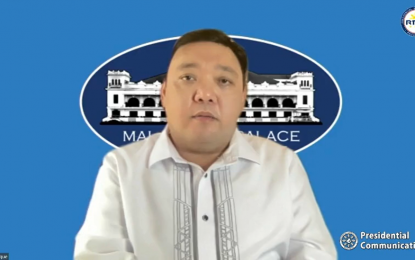
Presidential Spokesperson Harry Roque (File photo)
MANILA – Malacañang on Thursday downplayed the Philippines’ slipping two notches lower in the 2021 World Press Freedom Index as it disagreed that the country is facing a worse state of press freedom due to verbal attacks against online news site Rappler and media giant ABS-CBN.
The Philippines ranked 138th out of 180 countries in the 2021 World Press Freedom Index, according to media watchdog Reporter sans frontier (RSF) or Reporters without Borders, making it the fourth straight year that the country slipped in the ranking.
Presidential Spokesperson Harry Roque shrugged off the two-place drop as “de minimis” or insignificant.
“Dalawang posisyon lang po ‘yan, two positions lower. De minimis po ‘yan, wala masyado ibig sabihin (That’s only two positions lower. It’s de minimis, it doesn’t mean much),” he said in a Palace press briefing.
Roque said the Philippines performed better than other countries belonging to the Association of Southeast Nations (Asean) by ranking fourth highest on the World Press Freedom Index ranking in the region.
“Sa buong Asean, pang-apat pa rin po tayo (In Asean, we are the fourth highest). We are ahead of Myanmar, Cambodia, Brunei, Singapore, Laos, and Vietnam,” he said.
He also pointed out that the current ranking is equivalent to the highest ranking obtained by the country during the term of Duterte’s predecessor, President Benigno “Noynoy” Aquino III.
“Although ito ang pinakamababang ranking sa panahon ni Presidente Duterte, equivalent po ito sa pinakamataas na ranking nung panahon ni Presidente Noynoy Aquino (Although this is the lowest ranking during the term of President Duterte, this is equivalent to the highest-ranking during the term of President Noynoy Aquino),” he added.
Roque said he saw “nothing wrong” with the country’s ranking but noted that the RSF should not have counted issues concerning Rappler and ABS-CBN as bases for the country’s score.
“We see nothing wrong with it, pero (but) of course we dispute also the ranking because yung Reporters Without Borders considered as affronts to press freedom itong (this) Rappler issue na alam naman nating dinesisyon na ng SEC na hindi naman appointed ni Presidente Duterte at mga appointees ni Presidente Aquino pa at saka itong ABS-CBN na alam naman natin na kinakailangan talaga ng prangkisa. (which we know was a decision of the SEC which is not appointed by President Duterte and are appointees of President Aquino and this ABS-CBN issue that really needs a franchise to operate),” he said.
In 2018, the Securities and Exchange Commission (SEC) revoked the certificate of incorporation of Rappler Inc. and Rappler Holdings Corporation for allegedly violating the Constitution and foreign equity restrictions in mass media.
The Court of Appeals (CA) denied the motion for partial consideration filed by Rappler on Feb. 21, 2019, reiterating its ruling that the SEC should review its previous order revoking Rappler’s license.
ABS-CBN has also been forced to shut down its free TV and radio channels after its franchise expired in May 2020.
The House Committee on Legislative Franchises later denied the application of ABS-CBN for a new 25-year congressional franchise on July 10, 2020.
“We also dispute that these two issues should not have led to the decline in our ranking,” he added.
Roque also disagreed with the RSF’s mention of the rise of red-tagging and government attacks against local media.
“Wala po akong alam na ni-redtag ang Presidente. Ang Presidente po, sa tagal niya sa pulitika, alam niya kung ano talaga ang papel ng media. So hinahayaan niyang gawin ang kanilang mga katungkulan (I don’t know about the President red-tagging anyone. The President, who has been in politics for a long time, knows the role of media. So, he allows them to carry out their duties),” he said.
He, however, reminded journalists to refrain from being “onion-skinned” or sensitive to fiery remarks made by the President in response to criticism hurled at him.
“Ang mensahe lang sa media, siyempre maraming mga maaanghang na sinasabi laban kay Presidente at paminsan-minsan, sasagot mismo ang Presidente, maanghang din. In the same way na hindi natin inaasahan maging balat sibuyas ang ating Presidente, huwag din balat sibuyas ang media kapag sumagot ang Presidente (His message to media is, of course, there will be a lot of fiery words said against the President and sometimes, the President himself will also respond to them in a fiery manner. In the same way that we expect the President not to be onion-skinned, we ask the media not to be onion-skinned when the President responds to their criticism),” he added. (PNA)
